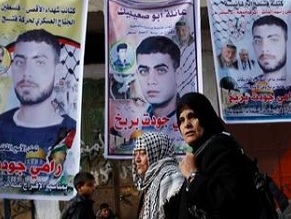|
World Jewish News

Gaza women walk past posters of Palestinian prisoners.Kosher restaurant. Photo: REUTERS/Ibraheem Abu Mustafa
|
Israel prepares to release third group of Palestinian prisoners
30.12.2013, Israel Israel was set to release 26 Palestinian security prisoners Monday overnight, after the High Court of Justice rejected a petition filed by bereaved families to prevent their release.
Unlike the previous 52 terrorists already released, the group released overnight included five residents of east Jerusalem. The Palestinians are demanding that in the next batch Israel include Israeli-Arabs who carried out terrorist attacks, something Jerusalem has until now adamantly refused to do. The Prime Minister's Office said that Israel never committed itself at any stage to release Israeli Arabs. A decision to do so would entail another cabinet vote.
Three of the prisoners will be released to the Gaza Strip through the Erez border crossing, and the remaining 18 will be released to the West Bank through the Betunya border crossing.
All prisoners have been moved to Ofer Prison ahead of the expected release, and the eight prisoners being released to east Jerusalem and to the Gaza Strip are already en route to the transfer points.
The release of the prisoners, all convicted terrorists who carried out their attacks before the 1993 Oslo accords, was the third batch of four groups of Palestinian terrorists Israel committed to let go as part of the framework that led to the re-start of the current negotiations in July.
US Secretary of State John Kerry, who brokered the deal that led to those talks, is due to arrive Thursday for yet another round of shuttle diplomacy.
According to Israeli officials he is expected in the near future to present a "document of principles," not a "framework agreement." This document is widely viewed as a vehicle to enable a continuation of the negotiations beyond the nine-month initial deadline for the talks, which is to expire at the end of April.
Late Monday night, the High Court of Justice rejected a petition to block the third Palestinian prisoner release in the current peace process.
The High Court of Justice paved the release Monday night when it rejected a petition earlier in the evening to block the move. But in an unusual development, the vote was not unanimous regarding five prisoners being released from east Jerusalem.
Although Supreme Court President Asher D. Grunis and Justice Zvi Zilberthal voted to reject the petition against all of the prisoners, Justice Elyakim Rubinstein broke with them regarding east Jerusalem prisoners, leaving a split 2-1 vote.
Whereas Grunis and Zilberthal viewed those prisoners as having no special intervening issues to force the court's hand in a matter of state, Rubinstein said he was not convinced that the ministers who approved the release had received sufficient information to fully weigh "all of the consequences" in the long-term of releasing east Jerusalem prisoners.
Rubinstein concluded his partial dissent with the hope that, "maybe this time, if there is some morality on the other side, or by some miracle, the low-life murders will not be received as saviors, as has happened over and over."
As the court was debating the appeal, victims' families marched through Jerusalem in heavy rain, protesting the release of five of the prisoners who live in east Jerusalem. The march, that started at the Prime Minister's Residence and ended at the Western Wall, blocked traffic in the capital.
While the majority of the protesters ended their march at the Western Wall, 15 selected family members continued on to the prisoner's home in east Jerusalem, as determined by the High Court of Justice earlier on Monday.
Prime Minister Binyamin Netanyahu addressed the prisoner release and the diplomatic process with the Palestinians at a Likud faction meeting in the Knesset, saying that "leadership is tested by making the difficult decisions. We were not elected to lead Israel in order to make the easy decisions."
Netanyahu said that Israel had a "strategic interest" in negotiations whose goal was an agreement that will put an end to the Israeli-Palestinian conflict. In an apparent reference to Iran, he said the negotiations were also important regarding "other strategic needs," and also to "maneuver" in a region undergoing enormous changes.
Netanyahu, when asked about the "framework agreement" that Kerry was widely believed to be working on, said that this has been mislabeled. He said what was being discussed was not an agreement, but rather a set of principles for continuing the talks.
These principles are expected to deal in broad strokes with issues of security, borders, refugees and Jerusalem, and is – according to one official – believed to be a way of extending the talks for another year.
Netanyahu said that only an agreement that ensured "Israel's security and the demilitarization" of a future Palestinian state would be signed. In addition, he said, such an agreement would have to "recognize Israel as the national home of the Jewish people" and include the Palestinians "giving up their dream of refugee return, and the rest of their claims on Israel."
Netanyahu told the Likud MKs that if an agreement were signed it would be first brought to the cabinet for approval, then to the Knesset, and finally to the nation in the form of a referendum.
It was not clear whether any document that Kerry may propose will need to be brought to the cabinet, with this – one official said – dependent on what is inside the document.
Netanyahu told the Likud faction he has not seen the document.
By BEN HARTMAN, HERB KEINON. Yonah Jeremy Bob and JPost.com staff contributed to this story.
JPost.com
|
|
